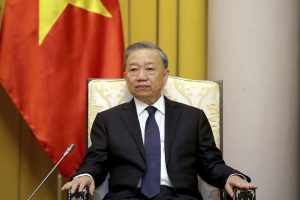Vietnam’s president was confirmed as the new chief of the Communist Party of Vietnam (CPV) on Saturday, two weeks after the death of long-serving General Secretary Nguyen Phu Trong.
In his inaugural speech on Saturday, President To Lam said that him taking the reins was because of “an urgent need to ensure the leadership of the party,” the Associated Press reported.
In the speech (a full English version is available here), Lam pledged to “vigorously promote the glorious traditions” of the CPV. He pledged to work toward “a strong, democratic, just, and civilized Vietnam” and for “well-off and happy Vietnamese people.”
Trong led the party from 2011 until his death last month, during which he rose to become the most powerful and influential figure of his generation. A committed ideologue who reportedly lived an austere and unadorned life, Trong led a drive to purify the party and harden its monopoly on power. An important part of this was his “blazing furnace” anti-corruption campaign, launched in earnest in 2016, which sought to root out corruption and restore the CPV’s reputation for probity and upright conduct.
The campaign, which has seen an unprecedented run of high-level resignations over the past several years, has been central to Lam’s political rise. As Minister of Public Security from 2016, he played a key role in the campaign, which also allowed him to target and eliminate political rivals. In May, Lam was elevated to the presidency, after Vo Van Thuong was forced to resign in connection with the anti-graft campaign. Thuong, like his predecessor Nguyen Xuan Phuc, who resigned in early 2022, was accused of “violations” that “left a bad mark on the reputation of the Communist party.”
In his inaugural speech, Lam implied that he would carry on Trong’s legacy on the domestic front. He pledged to “continually strengthen unity and solidarity within the Party,” to “step up the Party building and rectification,” and to “prevent and combat corruption and negative phenomena.”
It was not immediately clear if Lam would remain in his role as president. While it would be unusual for him to hold both posts simultaneously, it would not be unprecedented. Trong himself assumed the position of president following the death in 2018 of Tran Dai Quang, and held it until the CPV’s 13th National Congress in early 2021. Given that the past two presidents served only a fraction of their terms, and the fact that the preparations for the 14th National Congress in early 2026 are now well underway, it is probable that he will hold the largely ceremonial post until the Congress can select a replacement.
In any event, Lam’s official confirmation as the next party chief – he was appointed as acting general secretary after Trong’s death – puts him in the pole position to be reappointed to the party leadership for the next full term, and possibly beyond.
Given the impression that Trong left on Vietnamese politics during his three terms as party chief, the change of guard marks the beginning of a new era. At the same time, major shifts in either domestic or foreign policy are unlikely. “There’s a lot that we don’t know,” Australia’s ambassador to Vietnam Andrew Goledzinowski wrote in a thread on the social media network X. “What we do know points to continuity rather than change.”
In addition to maintaining Trong’s domestic priorities, Lam has given every indication that he will maintain the country’s ductile and pragmatic foreign policy, which has seen Vietnam strengthen its relations with major powers on both sides of the widening “new Cold War” divide.
During a press conference on Saturday, Lam said that “the core direction of our foreign policy remains unchanged.” State media paraphrased him as saying that the country “will continue to strengthen relationships with neighboring countries, major powers, comprehensive strategic partners, traditional friends, and other important partners.”
Nguyen Khac Giang, a visiting fellow in the Vietnam Studies Program at Singapore’s ISEAS-Yusof Ishak Institute, told the Associated Press that there was still some questions over how Lam would lead the party, but that his accession to the most important of Vietnam’s four top political posts, after a protracted period of intra-party combat, could lead to a new equilibrium.
“To Lam is the new unchallenged power who will dominate Vietnamese politics in the years, if not a decade, ahead,” he said.

































